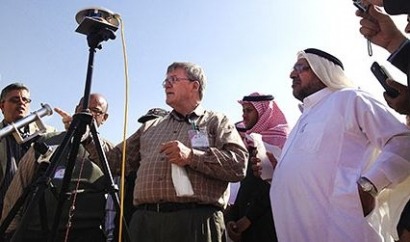
Saudi Arabia is turning to with US Department of Energy's National Renewable Energy Laboratory (NREL) for training and expertise in measuring kingdom's solar resource.
The Kingdom is planning to move aggressively into renewable energy, with plans to spend billions of dollars over the next two decades to install more than 50 GW in solar projects by 2032.
Not only will this level of development insure the nation will get 30 percent of its electricity from solar resources in two decades time, but the intensity of development represents more gigawatts of renewable energy than was installed in the entire world in 2012.
power in the country and meet at least 30 percent of its electricity needs with solar energy.
The make that goal a reality, Saudi Arabia's rulers have recognized the importance of setting up networks to gauge and predict solar radiation strength in varying meteorological conditions.
The support of NREL and its partner Battelle will cover installation of more than 50 monitoring stations throughout the kingdom as well as training of local Saudis to operate and maintain instruments and stations.
Nine Saudi engineers spent nine days at NREL last month, studying and discussing topics as theoretical as Ångström's law and the scatter-absorption ratio for the atmospheric effects on solar radiation, and as practical as the effect of sandstorms on solar panels.
NREL experts also engaged the Saudi staff with topics including waste-to-energy, geothermal technologies, calibrations, and solar resource forecasting.
"Saudi Arabia is determined to diversify its energy sources and reduce its dependence on hydrocarbons," said Wail Bamhair, the project manager for the Saudi team that visited NREL. "Renewable energy isn't just an option, but absolutely necessary. We have the means to build renewable energy, and we need to do it."
Because Saudi Arabia is lacking in coal and natural gas, it uses a tremendous amount of energy to desalinate water and heat turbines to bring electricity to homes and businesses. Electricity is particularly in high demand during the Saudi summer when temperatures routinely top 110 degrees Fahrenheit and air conditioners are rumbling.
Economists have suggested that a big move into renewable energy can strengthen Saudi Arabia's economy and free up millions of extra barrels of oil for export. Bamhair said that while Saudi Arabia has a lot of sun, it also has challenges such as a variable climate, sandstorms, and even the occasional snowstorm in the northern regions.
"We are working hand-in-hand with experts from NREL and Battelle who have these amazing minds," Bamhair said. "We are looking for them to build our human capacity. We are here to see, to learn, and to transfer the knowledge."
(Photo caption: NREL's Steve Wilcox at the K.A.CARE site training Saudi industry and academic personnel in solar measurements. Credit: Mike Dooraghir)
For additional information:

